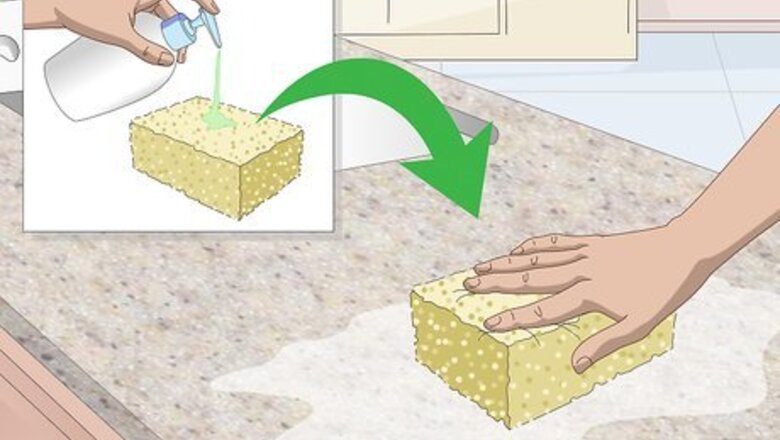
views
Routine Cleaning
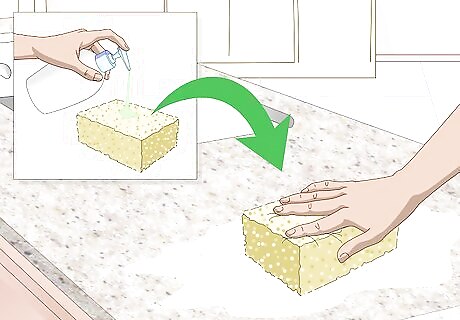
Use dish soap and water to wipe down the countertop. For everyday dirt, grime, and food residue, wet a sponge or soft cloth. Squeeze out a small circle of dish soap onto the sponge, and rub the soap into the sponge to get a soapy lather. Wipe down your entire countertop with the sponge. Rinse the soap off the counters with a damp sponge.
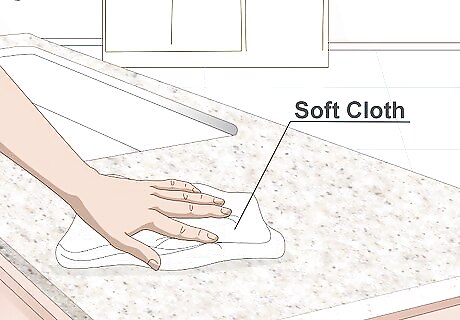
Dry the countertops with a soft cloth. Once the counters are clean, completely dry the surface. This helps prevent the formation of hard water marks and streaks. It also makes your countertops look slightly glossy. This routine cleaning method is the best way to maintain your countertops.
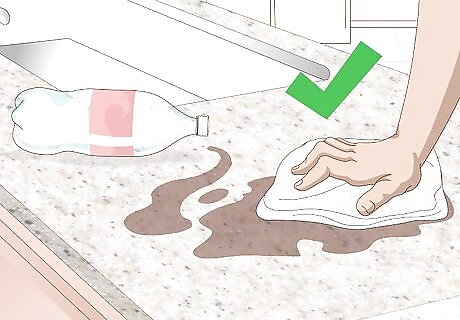
Clean up spills immediately after they occur. If you take care of liquid spills as soon as they happen, you should be able to prevent the majority of hard water marks and stains. Take care of these spills by using soapy water, rinsing, and drying the spot.
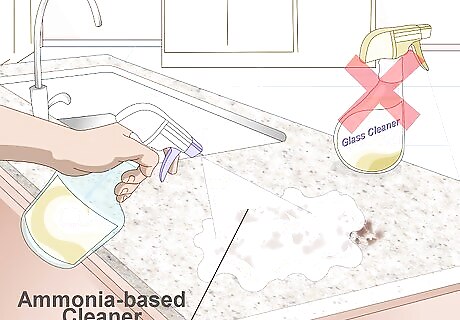
Use an ammonia-based spray cleaner for stubborn dirt. Many all-purpose kitchen cleaners contain ammonia. Be sure to check the label to ensure the cleaner contains this material. Spray the countertops down with the cleaner, rinse with a wet rag, and dry with a soft cloth. Do not use window or glass cleaners on the countertops. While many of these cleaners contain ammonia, they’ll leave streaks on your Corian. You can explore plant-based cleaning options if you prefer avoiding chemical cleaners. Many natural cleaning lines carry products specifically made to clean granite, quartz, and Corian countertops.
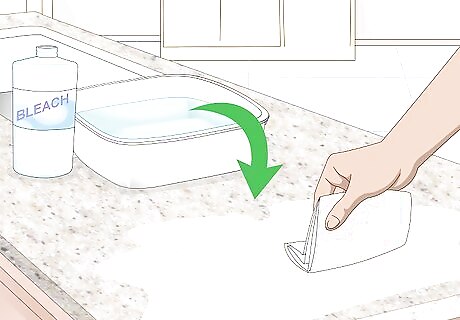
Use a bleach-based solution to disinfect the counter. It’s a good idea to disinfect your kitchen countertops at least once, and possibly twice, per week. This helps prevent the spread of bacteria. Make a diluted mixture of bleach and water by mixing one tablespoon (14.78 mL) of bleach with one gallon (3.78 L) of water. Wet a cloth with the solution and rub it over the entire surface by using small circular motions. Be sure to protect your eyes and skin from bleach while cleaning. Wear a pair of rubber gloves while you perform your disinfecting. If you prefer to avoid bleach, use natural disinfectant sprays and wipes instead.
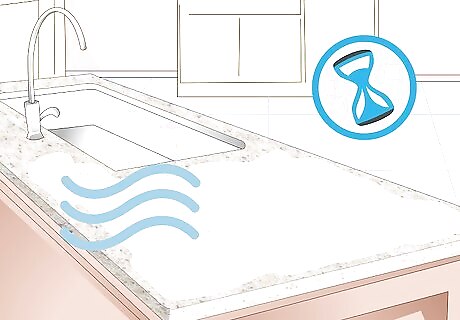
Allow the disinfectant solution to sit for at least two minutes or air dry. Give the solution time to do the work of disinfecting. For maximum disinfecting, it’s best to let the solution simply air dry on the countertops. If you prefer, you can wait a few minutes and then use a soft cloth to dry the countertops.
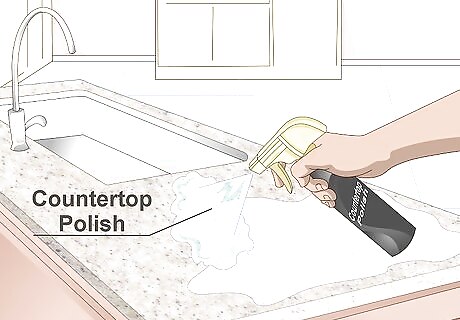
Polish glossy Corian countertops using a countertop polish. Corian countertops come with matte, semi-gloss, and high-gloss finishes. While no Corian countertop will give off the same shiny look as granite, you can buff and enhance the look of countertops with glossy finishes. Simply spray on the polish and buff with a dry, soft cloth. Move in straight lines and then use a side-to-side movement to buff the surface. It keeps the texture more aligned.
Protecting Your Countertops
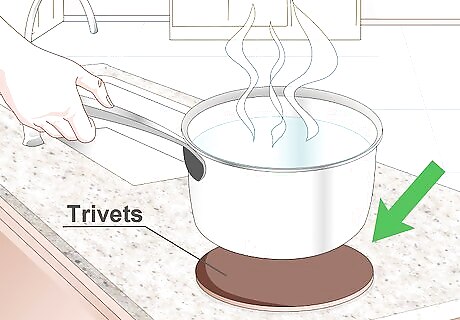
Place trivets, oven mitts, or thick towels under hot pots and pans. Be careful to protect Corian from heat, as it’s a relatively heat-sensitive countertop. Never move pots or pans directly from the stove or oven onto the countertop. Use heat-safe buffers under any of these items. Be sure to place buffers under crockpots as well.
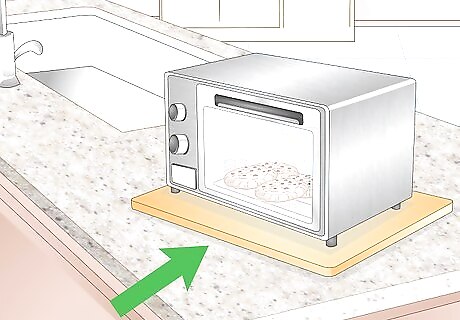
Place trivets under toasters and toaster ovens. Some toasters and small ovens have outer surfaces that can get quite hot. These heat-generating appliances may slowly damage your countertop if they’re left directly on the surface of the material. Trivets come in all shapes and sizes, so you should be able to find ones that fit beneath these items.
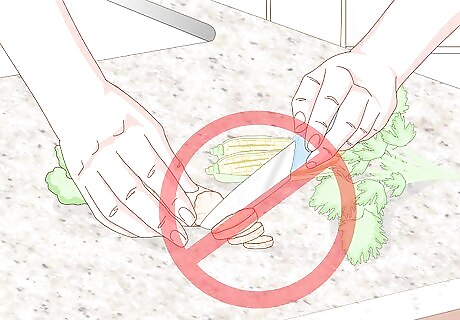
Do not cut directly on your Corian countertops. Knives will make marks in Corian countertops. While these scratches can generally be repaired, it’s better to avoid making them in the first place. Use a cutting board whenever you need to chop or slice something.
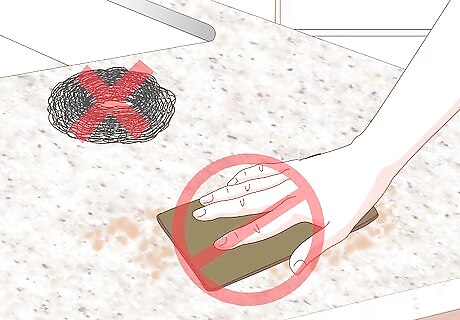
Do not use scouring pads or steel wool on your countertops. Abrasive cleaning tools will dull the surface of Corian countertops. This may make the color appear faded, especially if your countertop has a glossy finish. While these items likely won’t scratch the material, it’s best to avoid them.
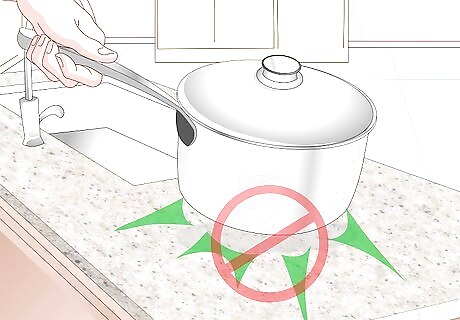
Avoid dropping heavy pots on the countertop. Corian is slightly less durable than granite or quartz, so it’s more susceptible to dents. If you drop something heavy on the surface, you may cause a bit of damage. Exercise caution when moving and lifting these items.
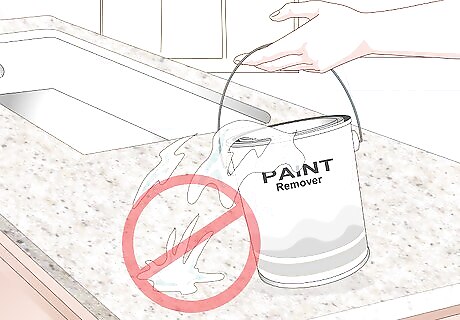
Prevent spills of paint remover and oven cleaner. If Corian experiences prolonged exposure to these strong chemical cleaners, they may eventually damage your countertops. If a spill does occur, immediately wash the spot with soapy water and a wet sponge. Then rinse and dry the area. Also avoid acid drain cleaners, acetone nail polish removers, and any cleaners that include methylene chloride. If you spill nail polish on your countertop, use a non-acetone nail polish remover to clean it off.
Removing Scratches, Stains, and Burns
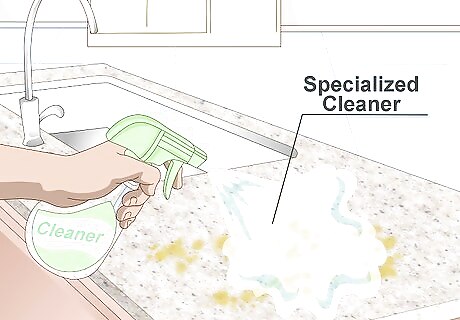
Remove hard water marks with a specialized cleaner. Hard water stains will likely look like a chalky white residue on the surface of your counter. There are several cleaners specifically made for removing these kinds of marks. Spray your choice of these solutions on the stain, let it sit for about 1-2 minutes, and then rinse and dry the area.
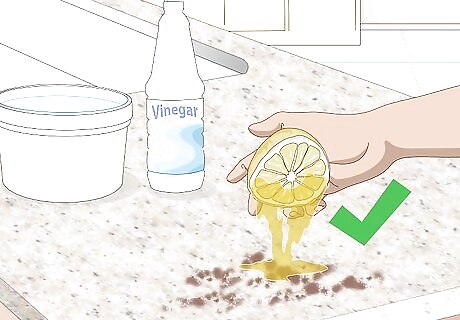
Remove hard water stains naturally with lemon juice or vinegar. There are a few natural solutions that may be able to stand in for chemical cleaners. Spray lemon juice on the stain and leave it on for ten minutes, then rinse and dry the area. Also, try wiping down the spot with a mixture of half water and half distilled white vinegar. Rinse and dry the countertop after you clean with this solution.
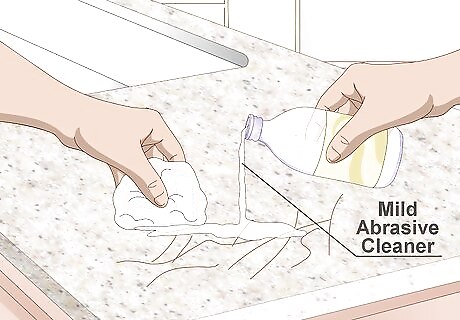
Remove marks and fine scratches with a mild abrasive cleaner. Pour a small circle of liquid mild abrasive cleaner on a damp sponge. Wipe the damaged area with the cleaner in small circular motions, going forward and backward as well as side to side. Clean the entire area, and then thoroughly rinse the spot down with warm water. Dry it with a soft cloth, and check if the damage has been removed. This should take care of most stains and blotches as well. You may need to repeat this process a few times before the blotch or scratch is removed. Apply more pressure with the sponge the second and third times.
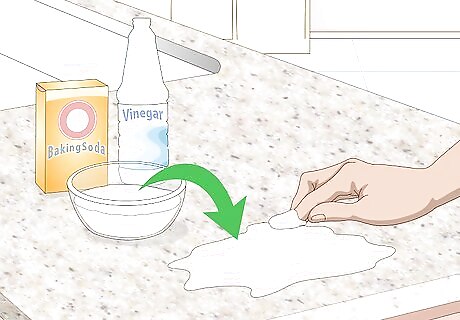
Remove scratches naturally with vinegar and baking soda. For a natural abrasive cleaner, mix distilled white vinegar with baking soda and clean in the same way you would with a chemical cleaner. Add enough baking soda so that the mixture is more of a paste than a liquid. Do not, however, use this solution as an alternative to cleaning your counters with soap and water.
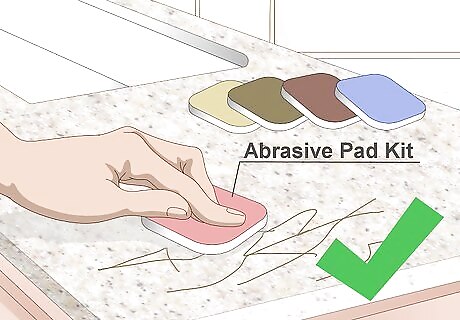
Remove deeper scratches using an abrasive pad kit. DuPont recommends using Micro-Mesh Soft Touch Pad kits on Corian countertops. These kits include several different “grit” options that allow you to slowly move from low-grit to higher-grit options, depending on the severity of the scratch. Be sure the area is thoroughly washed before you begin sanding. Leave the surface wet during sanding. Repeat the cleaning process once you’re finished sanding. Start with the peach-colored 1500 AO material. Next, try the blue 4000 AO pad, and finally the gray 12000 AO option. Lightly rub the pad over the scratch in a single-line motion, rather than a circle. Change your direction about 90° periodically, so that you’re making a box with your sanding motions. Rinse and dry your pad if too much residue builds up. Avoid pressing too deeply, as this may cause an indentation or deeper scratch.


















Comments
0 comment